The transcript from this week’s MiB: Richard Thaler and Alex Imas on The Winner’s Curse, is below.
You can stream and download our full conversation, including any podcast extras, on Apple Podcasts, Spotify, YouTube, and Bloomberg. All of our earlier podcasts on your favorite pod hosts can be found here.
~~~
Bloomberg Audio Studios, podcasts, radio News. This is Masters in business with Barry Ritholtz on Bloomberg Radio
Barry Ritholtz: This weekend on the podcast, two extra special guests, Alex Emus and Richard Thaylor took Richard’s book, the Winner’s Curse and really completely rewrote it and updated it for 2025. I’ve been privileged to speak with Dr. Thaylor number of times over the past few years. He’s been a guest, boas both here and live in Chicago a number of times. Always a fascinating conversation. And Alex Emos is this really interesting professor who I had no idea I have used and relied on his previous research. Selling Fast and Buying Slow is a chapter in my book. Just an amazing coincidence, both fascinating people, and I thought this conversation was a lot of fun. And I think you will also, with no further ado, Alex Imas and Richard Thaler on The Winner’s Curse.
Richard Thaler: Thanks, Barry. Thank you. Great to be back.
Barry Ritholtz: It’s so great to have you. So you started, you wrote this book, it’s 30 years ago already. We’re gonna get to to this in a bit. Before we do, I wanna just talk about both of your backgrounds and how you began collaborating. Richard, you’ve been called the Godfather of Behavioral Economics. Take us back to the beginning when you were a young economist, how did you become interested in psychology and decision making?
Richard Thaler: So when I was in grad school and I was learning standard economics, I kept pausing and saying, really, because the models that we were being taught, the people, well, there are no people in, there are agents, and there are firms, and there are things they call consumers, but they’re not really people.
Barry Ritholtz: Homo economus
Richard Thaler: homo Economicus. And, and I started making a list of dumb stuff people do. And, but that was just to annoy my friends. And, but then somebody introduced me to the work of two Israeli psychologists, Danny Kahneman and AMO Ky. And when I read their papers, I had this big aha moment because what their research showed was not just that people make mistakes, of course we all make mistakes and can’t remember where we left our keys or what have you. What what they showed was that behavior is predictably different from the model that economists use. And that was an aha moment for me because it meant I could say, look, the model is wrong and in this direction. And you can think about that from, from an investment point of view. It, it, it’s fine to say stock prices are wrong, that’s fine, but useless.
If you can say which ones are too high and which ones are too low, then all of a sudden you’re a very rich man. So if, if we could say how people are different than this artificial model, then we could be in business. And then the, so I was doing that for a while, managed to get tenure at Cornell University and spent a year with condiment anderski, and then a second sabba year with Kahneman. And in 1985, the year Alex was born, I came back from sabbatical and decided to start writing a series of columns in a new economics journal called The Journal of Economic Perspectives. That journal, by the way, here’s a free tip. That journal is available free to anyone. And the articles are written to be understandable and people don’t know about it. If you’re really interested in economics, go and read some papers.
Barry Ritholtz: And, and the column you were writing was called “Anomalies” which were all of these things that were supposed to not be possible given traditional economic theory. You mentioned Kahneman and Toky. When you think of psychologists, you don’t think of quantitative data-driven rigorous models. But really that was at the heart of what they were doing, wasn’t it? Well,
Richard Thaler: Eventually, the, the, their earlier work, you’re thinking of prospect theory, which was 1979. The work they did in the seventies leading up to that was on predictions or judgements. And the, the models weren’t very quantitative. They, they were typically a little scenario and almost like a thought experiment. You know, know there’s a famous experiment about Linda, and they give you a description of Linda, she was an undergraduate active in social movements, went to lots of demonstrations, blah, blah, blah. She’s now, and now you get a list of occupations and you’re asked to say which is most likely. And one of the ones is bank teller, and another one is feminist bank teller. And people think she’s more likely to be a feminist bank teller than a bank teller. Now obviously that cannot be true. I shouldn’t say obviously, because many people are now listening and saying, what does he mean? Obviously, obviously she’s a feminist bank teller. She couldn’t just be a bank teller, but that’s, you know,
Barry Ritholtz: Do the number theory. There are gonna be more bank tellers than from feminst bank tellers…
Richard Thaler: Yeah. Just think of a Venn diagram, right? Right. There’s a, a, a big circle of bank tellers, and then the small one with feminist bank tellers. So that was the kind of things they were doing. There was a little bit of theory. So like they had, the idea was that life is hard. And so people used what they called heuristics rules of thumb to make judgments. One is called the availability heuristic, which is, if it’s easier to think of examples of something, it’s more likely. So if you ask people what’s the ratio of homicides to suicides, people think maybe two or three to one, that homicides are more likely. It’s just the Opposite. Twice as many suicides. Think about this, before you buy a gun, right? The most likely person to get killed with that gun is a family member. So
But again, notice this is a predictable mistake. And because why? Well, there’s lots of stories in the newspaper about homicides. Suicides tend to be quieter.
Barry Ritholtz: There’s a wonderful graphic from our world in data, which was Hans Ling’s work that shows here’s how things are reported in the media, and then here’s their actual percentage in real life. Very little reporting on cancer, heart disease, high blood pressure, diabetes. You’re 50,000 times more likely to suffer from that than homicide, terrorism, or shark attacks, which they love to. Right.
Richard Thaler: Shark attacks don’t worry about so, so much. Australia,
Barry Ritholtz: especially in Chicago, it’s probably not a big,
Richard Thaler: , there are very few. So let’s, let’s bring Alex in. So when Richard started out in the field, there really wasn’t any such thing as behavioral economics. You have an advantage a few decades later of entering the field of behavior, of, of economics where behavioral economics is a thing. Tell us a little bit about what brought you into the field and how you found your way over to Booth.
Alex Imas: Well, so behavioral economics was a thing out in the economics journals. And, you know, there were people certainly doing it in various departments, but it wasn’t a thing at, as an undergrad. Like I don’t think. There was a single behavioral economics course offered at Northwestern Econ University while I, and this was 2000, 2003 through 2007. So even though, you know, people were publishing behavioral economics papers, it was all over the journals. People generally in the field knew about it as an undergraduate. It still had not made it into the curriculum.
Barry Ritholtz: 03-07? Danny was 2002 on the Nobel, is that right?
Alex Imas: Yeah. Still no classes.
Barry Ritholtz: So you would’ve thought someone might’ve picked up on that. And yet, Northwestern is a big school.
Alex Imas: Open up a microeconomics textbook. It’s the same textbook from 1973 basically.
Richard Thaler: And that’s still true today.
Barry Ritholtz: Come on. Really? Yeah. I would’ve assumed at this point…?
Alex Imas: No, open up a textbook.
Barry Ritholtz: Danny Kahneman, Bob Schiller, Richard Thaler, how many, how many Nobels have to come in this space before starts …
Alex Imas: With perfect competition. Then at the end, maybe you learn something about monopolies and that, that’s pretty much it. So it’s, I actually, I was pre-med. I was a, I’m an immigrant kid from Moldova. So my parents are like, well, it’s, you’re going to the medical school or you’re gonna fail, basically. So I got, I had one option on the table, so I was pre-med, organic chemistry was real hard, and it was eight, eight o’clock in the morning. Right. So I took econ to kind of just boost my GPA, I thought it was kind of fun. Right. And, you know, I didn’t, and it was interesting ’cause I was taking these psychiatry, abnormal psychology classes, learning about human behavior. I was taking economics, which is the study of human behavior. And these were like two completely different worlds, right? Economics is these hyper-rational utility maximizers had never made any systematic mistakes.
And no, I didn’t learn about a single deviation from that principle in the entire four years I was there. And so I was, I was thinking this is kind of, you know, this is fun, but not something I wanted to do. I’m interested in human beings. And then afterwards, I was applying to medical school and I was doing a cross country road trip with one of my friends to Los Angeles, and we were listening to, I think it was NPR, and it turned out ex post, I figured this out, Richard was on the radio right, talking about something called behavioral economics. And I was like, what is this? And as soon as I got to Los Angeles, you know, I, I went on the internet and I was like, I gotta find out more about this field. So I, within two weeks I had, you know, talked to my advisors at Northwestern. I’m, I, I want to get an econ PhD. If I can do something like this where I could combine my interest in economics and bring in human behavior into it, this is what I wanted to do.
Barry Ritholtz: So let’s talk about that. There’s something in the book, and we’ll get to that shortly, where you describe Richard, you describe an economist developing a new model, a new calculation for how consumers should behave in response to certain price incentives. So the first time ever someone creates this calculation, and then immediately afterwards, and therefore this is how all consumers are or should be behaving, when nobody had thought of this previously, how do you square that circle? How do you square the model driven? This is the right way to do it. I just figured this out and therefore everybody should be doing it this way.
Richard Thaler: Yeah. You, you know, maybe just a tiny bit of history will get us there. So economics didn’t use to be that extreme. If you go back and read Adam Smith, he talks about self-control problems and overconfidence. And people think of him as the father of right-wing economics. That’s not the guy. He did talk about the invisible hand, but he was a behavioral economist at heart. And economists were pretty reasonable until about World War ii. And then what happened was people started writing math, doing math, and they wanted to write down models. And if you wanna write down a model, the easiest one to write down is a rational model. And that, that’s because anybody, if you’ve taken high school calculus, you know, you can maximize, you set the first derivative equal to zero, and that’s the model, right? So writing down a model of some ish is hard.
Then during the seventies and eighties, people g started to get ideas for even smarter behavior. And a norm kind of developed in economics, which is, if the agents in my model are smarter than the agents in your model, then my model’s better than your model. Hmm. And that’s kind of crazy. But the, that was the way the, the field was going. And, and there was no real stopping it. So around the time that Alex was thinking about going to grad school, there were troublemakers like me, pointing at certain body parts of this naked emperor. But the, the field was rushing toward an extreme version of homo economicus, where homo economicus is a genius.
Barry Ritholtz: So we were talking a little earlier about the so-called wealth effect, which is something that the economists at the Federal Reserve love. The, the higher the market goes, the wealthier people supposedly feel, and they all go out and spend money. That’s just such a perfect example of a model that doesn’t reflect the real world. A huge amount of stocks are owned by the top 10%. It’s something like 52% of stocks. The average person doesn’t really have a whole lot at stake in the market. And the reality is people are spending more money ’cause the economy is doing well, they have jobs are getting raises, which by the way, all helps the market. How often do we run into these correlation-causation issues in economics?
Richard Thaler: Well, we run into them all the time. Look, the big problem with that, with the wealth effect, there’s a lot of discussion of that in this book. That one thing economists leave out is what I call mental accounting. And if you look at an economic model of the wealth effect, there’s some big W for wealth, and that’s it. And wealth will include your house and your retirement. Money and money you’ve set aside for your kids’ education, and then money that you intend to give to charity and your future expectation and right. And the, of all of the money that you stand to learn in the right. So now the, the people at the fed, if they’re just saying, well, W goes up, then people spend more. No, it turns out, for example, if the value of your house goes up, how much more do you spend? Approximately zero.
Barry Ritholtz: Really?
Richard Thaler: Approximately zero. Whereas if some stock you own gets bought and you get a check, you spend a lot of that. If you win a lottery, you spend like half of it and go bankrupt. So, so where the money sits has a big effect on how much of it you spend.
Barry Ritholtz: Your response to somebody’s question, “How are you gonna spend the windfall from the Nobel Prize?” was one of my favorite answers. You said it, do you recall?
Richard Thaler: Yeah, well, I recall, I mean, this was at four in the morning, they call you and wake you up and then say, go get some coffee because you have a press conference in half an hour. And I had heard enough of these interviews to know that somebody was likely to ask me that question. And my instinct was to say, well, you know, to a real economist, this is a stupid question because how am I gonna know? You know, suppose I go out and buy some fancy new car, Barry likes fancy cars. I like fancy wine. So suppose I go and buy a case of fancy wine, how do I know that’s the Nobel money as opposed to the money I got from selling a book?
Barry Ritholtz: All dollars are fungible,
Richard Thaler: All dollars are fungible. And you know, I, I’ve realized later that what I should have done is opened up a special account,
Barry Ritholtz: The Nobel Prize money account
Richard Thaler: the Nobel Prize money, and a credit card that’s linked to that. And when I wanna go buy something stupid, just take out the Noble card and life would be more fun.
Barry Ritholtz: You, but the line that you said was as irrationally as I can.
Richard Thaler: I said I’ll just spend it as irrationally as possible. Just, I knew it would be a memorable line. So
Barry Ritholtz: It’s so funny because that line led to a conversation with my CFO about the difference in all of these Chase Sapphire card or the Amex platinum card where you get these points and the rational CFO says, “Hey, I want the money back each month. And my response is always, it’s a $100 or $200; it’s lost in your bank account. You don’t see it.
When I get the points and want to buy a fancy cappuccino maker that my wife is going to yell at me: “Why are you spending $2,000 on a cappuccino maker? You idiot.” My answer is, oh no, it’s points, it’s free. And she’s like, okay, go, go get it. It’s the exact same concept. If you have that silo, that mental accounting, you could do as much irrationality as you’d like.
Richard Thaler:So, you know, but watch out if she listens to this podcast,
Barry Ritholtz: She listens to the first five minutes and that’s it! Taps out.
Richard Thaler: So you’re safe. I’m okay because, so I’ll tell you a story about my daughter Maggie, who lives in Rhode Island, and one of her neighbors grew up to be a pitcher for the Mets. And the Mets were playing in the playoffs in the first round. So
Barry Ritholtz: This is a long time ago. Yeah.
Richard Thaler: And this is an old story. And thi this guy was gonna pitch. So I call Maggie, “Hey, would you guys wanna go to the game? Let me see if I can get tickets. And she says, oh, that’d be great.” So I go online, the, the game is like tomorrow and I find some tickets. And there, there were a bunch, you know, on StubHub or something you could get tickets. So I text her back and said, look, here, here’s the website. It looks like there are lots of tickets to choose from. How about the tickets were about 300 bucks. I said, how about I’ll text, I’ll send you a thousand dollars, buy the tickets you want, spend the rest on hot dogs.
Barry Ritholtz: So you’re, you’re doing an experiment on your daughter to see if she buys the cheap tickets or the expensive ix?
Richard Thaler: No, no. So she texts me back and says, LOL this is just like in your book. If you send me a thousand dollars, I’m not going to use it on baseball tickets. So I’ve learned my lesson recently. She wanted to go to a concert. David Byrne is on tour and he was in Providence where she lives, and she wanted to go and she says, There’s some way you could get me tickets. I sent her the tickets instead of the money.
Barry Ritholtz: That’s so funny. Let’s talk a little bit about the book, the Winner’s Curse. And I wanna start with Alex. So this book has been out since you were a young kid. You go to college, you eventually figure, let me get a PhD in Behavioral economics or Finance and economics. How did you first discover this book? What was your initial response to it?
Alex Imas: So I discovered it, there’s not really any textbooks and behavioral economics. So you kind of get here through the grapevine, oh, you should read this, you should read that. You mostly read journal articles, like with, if you’re thinking about doing game theory or something like that, there’s like a five or six textbooks that you can read with behavioral economics. There’s not a whole bunch. Winner’s Curse was one of those books that almost everybody recommends because the anomalies columns are just very, very accessible. And then you read the anomalies columns, they got a bunch of references, you look through the references. So I had read the original Winner’s Curse, I think second or third year of grad school. And then I got my first job at Cardi Mellon. I had already known Richard for a while at that point. We met in grad graduate school. His office was, happened to be right next to mine in San Diego.
And at some point I joined Booth and he called me up, I think like four or five months into my, into, into my first year and said, Hey, you know, I got this opportunity. We wanna, we, the publisher asked us to update the book. I’m thinking of doing a little bit more than just an update. You know, the books from 1992, there’s been 30 years of research. Are you interested in working together on this? So I, I mean, I jumped on the opportunity one, you know, I get to, to work with Richard, which is super fun. But two, I mean, you know, I’ve been doing behavioral economics research for a while and I know how much demand there is for a book that people can pick up and read and say, Hey, these are the original anomalies. Here’s the 30 years of research that has happened since. Now. I think at, at that point we were thinking like, you know, six months do a little update.
Barry Ritholtz: This was 2020 ?
Alex Imas: This conversation happened in 2020. The book is coming out now. We, you know, basically the two thirds of the book ended up being brand new. We wrote, we rewrote slightly, each anomalies column is kind of the bedrock. But, you know, 30 years of research has happened since. And it took a while to put all of that together. And essentially what we showed is, look, the original anomalies, when you read them, most of the experiments, most of the findings are from, you know, college students. Sometimes, you know, after a bad night out in the lab for, you know, making decisions over a dollar. And the big kind of pushback from economists was, look, we don’t really care about these people. We care about, you know, institutional investors, CEOs, we care about people who are in the market with money on the line making all these big decisions. And so what, why has behavioral economics become a success? Honestly, largely because of behavioral finance, because of the fact that behavioral economics, behavioral economists said, look, we got access to this amazing data on people making consequential decisions day in and day out. And they’re still making mistakes coming
Barry Ritholtz: I love what Danny Kahneman once said is, I suffer from all the same behavioral biases that I’ve identified. You mean to tell me that we have 30 years of data, all this research, a handful of books. People still make the exact same behavioral mistakes they used to. Has there been any change in behavior essentially?
Richard Thaler: No. And that’s not that surprising because the stuff we’re talking about has been true as long as there have been humans. Right? So we talk about self-control problems, it’s in the Bible, right? You know, Homer talks about Odysseus tying himself to the mast that that’s like agreeing to have money taken outta your paycheck and put into a retirement plan. So human beings, yes, there’s evolution, but evolution takes thousands of years. Yeah. And 30 years is the blink of an eye.
00:27:05 [Speaker Changed] Since, since you mentioned retirement accounts, let’s talk a little bit about choice architecture and nudge. Before I, I arrived here, I looked up what was the impact of the default setting that you helped change through choice architecture? People used to get a new job, sign up for a 401k, and the money would come into that account and it would sit there in cash. And rather than have the default be cash, we through your work created a default as a, either a target date fund or a balanced fund, something like that. So it’s not sitting in cash. And it turns out there’s about 4.7 trillion with a T trillion dollars in those funds, of which 40%, according to recent research, was the default setting. So you get credit for about $2 trillion in retirement savings that might have otherwise just been sitting around in cash. How does the concept of people aren’t learning from their mistakes? So choice architecture is so important to help people make better decisions. How significant is that?
00:28:20 [Speaker Changed] Well, if you think about what was going on in the, in the early eighties, these defined contribution plans like 4 0 1 Ks were real new. Our parents, w if they, if you worked at a big firm, you had a defined benefit plan. My father worked for Prudential Insurance, you know, and his pension was number of years, worked times some function of his final salary, no decisions to make, kinda like social security. And we bring in these defined contribution plans, you have to decide whether to join and if so, how much to defer and then how to invest it. And people had no clue. And the lot of people just didn’t even join, which is about the dumbest mistake you can ever make.
00:29:22 [Speaker Changed] If you have a company with a match, you’re basically turning down free money. Right? Which, what economic model says that’s rational.
00:29:28 [Speaker Changed] No. Well, right. So I would say to economists, look, you would predict no one would make this mistake. But one early study, half the employees at a company are not joining in the first year. It’s amazing. So how do we fix that? Well, the simplest thing was to change the default. So we say, it used to be you’d get a form to fill out a piece of paper in those days. And if you wanna be in the plan, fill out this form and say you wanna join and how to invest, change that to you’re, you welcome to riddle’s management.
00:30:18 We have a pension plan, we’re gonna enroll you unless you opt out and we’re gonna enroll you into the default fund unless you choose otherwise. So all of that was not possible in the early nineties because there were companies were afraid to do automatic enrollment because they didn’t have permission. And target date funds weren’t legal. Hmm. Ironically, in the George W. Bush administration on one side, they were campaigning to partially privatize social security, but their labor department was forbidding companies from investing in anything that could go down. So there was a bill passed in 2006 that said, okay, you are allowed to automatically enroll and have a, an automatically escalate what we used to call savemore tomorrow and invest in some prudent funds.
00:31:42 And what was what You have to give something up to get that. So what, what I suggested to, there was a Republican senator from Utah who was the running the relevant committee. I said, how about if companies a agree to do all three of those, they’re exempt from some burdensome paperwork of non-discrimination rules. And so that’s what the Republicans got was less paperwork and people who cared about the workers got something. And so, and the workers got something and the the workers got something. And if they just do nothing, then they’re in and their contributions are going up and they’re in a sensible investment PO product.
00:32:40 [Speaker Changed] So this is kind of in nudge is kind of fascinating ’cause in the winner’s curse, you talk about things very much related to what happens in investing. So there’s loss aversion and the status quo bias and a variety of different things. Let, let’s talk about what are the issues that most relate to, as Alex said, behavioral finance as opposed to behavioral economics. What do we think are the, are the biggest factors that explain irrational human behavior in, in stock and bond markets?
00:33:18 [Speaker Changed] So I think there’s a few things that kind of people documented in the late nineties, early two thousands that have just replicated and just became bigger, if anything. So the disposition effect is one of them. So the disposition effect, this is Sheron and Statman. They dec they came up with a paper in 1985 documenting it originally. Terry Ode has this giant data set that he published in 1999, documenting it in a bit of a larger sample. And then now it’s been replicated in Finland all over the world. And it’s this tendency for people, you know, when I, when I buy a stock, it goes up in price. What do I do? I sell it. I wanna realize my gains same stock goes down in price. It, you know, this is now a loss. What do I do? Hold onto it. So it’s this tendency to realize your gains and hold onto your losses.
00:34:08 [Speaker Changed] Peter Lynch, by the way, 40 years ago, used to call that cutting your flowers and watering your weeds. That was his expression for it. So it was, it was visible to a guy running a fund at Fidelity in the 1980s.
00:34:23 [Speaker Changed] Yes. And it’s, and and this is just talking about like, are people learning? I mean, apparently not because it’s like, it’s again, you, I bet you you download Robinhood data from today, you’re gonna see it show up. So that’s the, the, and this is kind of the tendency, you know what feels good when you’re, when when, when you own a stock, selling it at a gain and you know, telling your friends, Hey, you know, I bought that thing for 90, it’s one 20. I just, I just made a lot of money. You know what feels worse, telling your friends, I bought it at 90 and I sold it at 60. So you just kind of hold onto it hoping something happens. Maybe some people even double up buy more shares just to break even. So the disposition effect this kind of tendency for individual behavior to, you know, realize gains, avoid losses.
00:35:08 The other thing is I, and I in my view, this is kind of the bigger, the bigger principle is limited attention. So, you know, there’s a lot of stocks out there, which ones are people buying? And this is not just retail investors, this is, this is bigger institutional investors too. It’s the ones that are covered in the news. We were talking about availability bias earlier. What are the things that are coming to mind? Things that, that have recently been covered. Maybe you heard an earnings announcement call or something like that. These attention grabbing stocks, they’re much more likely to go into people’s portfolios. It’s because people don’t, you know, aren’t evaluating the entire, the entire universe of stocks whenever they think they’re thinking about something to buy. So,
00:35:49 [Speaker Changed] So let’s address that because the United States happens of, of all countries not only has such a large stock market Yeah. But the home country bias is so acute here. And you don’t hear a lot about foreign con companies all that often. You mostly hear about local companies, local CEOs, local products. How significant is that sort of bias in people’s portfolios being not only overloaded with their own country, but hey, if you are in New York, you can have more finance companies. If you’re in San Francisco, you have more tech companies. If you’re in the Midwest, you’re gonna have more manufacturing companies.
00:36:30 [Speaker Changed] It’s, it’s more extreme than that. If I’m working for a specific company, I have more of that stock.
00:36:34 [Speaker Changed] When, if anything, you should have diversified.
00:36:36 [Speaker Changed] Right?
00:36:38 [Speaker Changed] Yeah. I think one campaign that has been moderately successful is I think fewer companies are foisting stock of their own company onto the workers. It used to be the match was often paid in company stock.
00:36:56 [Speaker Changed] Well, GE was notorious and they lost half a trillion dollars of employee investments because of their match.
00:37:05 [Speaker Changed] Well, and Enron.
00:37:07 [Speaker Changed] Enron, so my, one of my, one of my friends, their, their, their father, he was working at Enron, he was a risk manager. FYI and oops,
00:37:19 [Speaker Changed] Just not a very good one. Huge, huge percentage of his p although, although portfolio, although you could be the greatest risk manager there, the bosses were not listening to you.
00:37:27 [Speaker Changed] Right. But they compounded it by putting their employees money in the 401k into and run stock. Run stock. Yeah. So they get fired and their retirement money goes poof.
00:37:41 [Speaker Changed] Right. Unbelievable.
00:37:43 [Speaker Changed] But you know, looking back at what people were owning, I mean there is that, you know, people in the 401k element, but people who were working there were freely buying Enron stock. Right. This according to economic models, you should be diversifying. You already have a bunch of Enron stock in your 401k, you shouldn’t be taking your discretionary spending and buying more Enron stock. And that’s exactly what was happening. Hmm.
00:38:06 [Speaker Changed] Really, you know, this home bias applies all around the world. At least the US is a big country. I wrote a paper once about the Swedish social sec, sort of 401k plan. This was a risky move ’cause I was making fun of it. And there was some award that might happen. But anyway, Sweden is 1% of world
00:38:35 [Speaker Changed] GDP, tiny, tiny GDP tiny stock money. And
00:38:38 [Speaker Changed] They weren’t putting most of their money in Swedish stocks. It’s crazy.
00:38:42 [Speaker Changed] They, they ignored the other 99% of the world. Yeah. But that, that just goes to show you the bias. So the obvious question is, if you two were advising a portfolio manager, what sort of behavioral principles would you emphasize for them to build a robust portfolio?
00:39:01 [Speaker Changed] Well, as you know, I, one hat I have is I’m involved in a company that does this,
00:39:09 [Speaker Changed] That has also has your name on the door. It
00:39:11 [Speaker Changed] Also has my name on the door, fuller Ann Thaler Asset Management. And I, now, let me say I cannot name a single stock wheel and no one at the firm would think it’s a good idea for me to be making suggestions. Were buy small cap stock. So it’s, you know, if we owned Apple or Tesla, I might know it, but we don’t buy any big stock. So they’re mostly companies you’ve never heard of and I’ve never heard of them. But
00:39:45 [Speaker Changed] This is because you’ve identified a behavioral issue that is now reflected in the model that you they use to purchase.
00:39:54 [Speaker Changed] Right. So we we’re not, we’re not a quant shop, which is a little unusual for a firm that’s run by some academics, but each strategy is based on a bias. So there’s one that’s based on overreaction. There’s one that’s based on under reaction. So we are, we try to find stocks that we think the rest of the market is making a mistake about. And then we forbid the portfolio managers from forecasting earnings because we, that they’re gonna be, you know, do we think with our 30 employees that we’re gonna make better forecasts than fidelity? It’s crazy. But we think we have an advantage. ’cause we’re trying to predict something else. We’re trying to predict the mistakes. It’s like you’re a baseball fan. If there’s a pitcher that is a sinker ball pitcher, so the Alex, this means the ball goes down as it approaches the plate, these foreigners. But you know, if there’s a sinker ball pitcher, you and I can predict batters are gonna hit ground balls because they’re fooled. The ball drops. And if you hit it slightly above the center, the ball goes down. So you don’t have to be able to hit a ball to know it’s gonna go down. And so we don’t have to be able to forecast earnings to predict that other people are gonna be predicting too high.
00:41:36 [Speaker Changed] I wanna bring this, this back to the book. ’cause one of the concepts underlying the book was, Hey, there’s a reproducibility issue in, in social sciences, how well have these anomalies and the theories you built around them, how well is this held up? How robust and reproducible are these findings? And it turns out very, talk to us about what, what you guys discovered when you were revisiting all of these principles that were first written about 20, 30 years ago. Yeah,
00:42:08 [Speaker Changed] So as you mentioned, there’s a, there’s a, some I call a crisis of reproducibility and social science more broadly. So this is psychology, some sociology, et cetera. And the worry is that, you know, these anomalies that were published in in the eighties and nineties, these are the bedrock of the entire field of behavioral economics. And you might be worried like, look, maybe these things don’t reproduce and there’s two ways that they can’t, they don’t reproduce one, you run the same experiment again and it doesn’t work. It was p hacked, as I said, like small sample sizes, no incentives. The second way by not reproduce is that it literally only reproduces in the exact conditions. It was run originally with college students at low stakes. You go out in a different population with people who are a bit more sophisticated, know what’s going on and you know, it doesn’t work.
00:42:55 So what we did in the book was to say, look, let first, let’s take the exact same experiments and run them again. Everybody knows about, you know, the, the original anomalies. So maybe they don’t work because people are like, ah, this is a loss aversion experiment. I know what’s going on. I’m not gonna do this. This is the endowment effect. I’m not gonna do this. So we just replicated them directly on a completely different platform. So we used an online crowdsourcing platform called Prolific Basic. Everything works. Everything works. And we, you know, you don’t have to take our word for it. We, if you go on the website of the book, we posted all of the results of our replications, but also instructions on how you can do it yourself. So if somebody’s like, ah, I don’t, I don’t, I don’t know about these guys, I run ’em yourself.
00:43:41 And you know, people are still loss averse. They still have the endowment effect things like the conjunction fallacy, the Linda problem that, that Richard was talking about. All works still. The second part is this external validity part. Does anybody other than college students display these, these effects? And that’s kind of the updates part of the book. And the answer is yes. You know, the loss aversion has been and the myopic loss aversion ver part that’s been used to explain the equity premium puzzle that’s still reproducible. We also do a bunch of outta sample tests of the, of the anomalies that didn’t use experimental data. And you know, that replicates outta sample too. So people aren’t learning. The psychology is the same. You know,
00:44:27 [Speaker Changed] One of, one of the comms was about the equity premium puzzle. We didn’t include this in the book ’cause it’s a little wonky, but the equity premium is just the difference in returns between stocks and bonds. The equity premium puzzle is how big it is. And theory says it should be like less than 1%. And historically it was about 7%. Wow. And the article about that was in the early eighties. So we’ve had 40 years of data since the puzzle was announced. The equity premium exactly the same. It’s, I mean, 1% lower. So, and that’s what we see basically everywhere. Everything’s the same.
00:45:12 [Speaker Changed] So, so one of the concepts that people have challenged is not being very reproducible has been the concept of priming to some sometimes anchoring is, is similar, but that seems to be more reproducible. But when I hear Linda, the bank teller story, that feels like the framing of that is very much a priming when you hear about her as politically active and yeah. Being involved in what, how do you distinguish when you have these theoretical overlapping biases that all kind of interact with each other?
00:45:49 [Speaker Changed] Yeah, so priming is actually a huge literature in cognitive psychology. Basic priming is very robust. So it’s the idea of, you know, I say a bunch of words that start with a k, what comes to mind, a word that starts with a K that’s gonna reproduce any day of the week. There’s a special subset of priming research that was done kind of in the nineties, early two thousands that kind of took this to an extreme, which is, so here’s an example. Let’s say you’re doing word search and there’s a bunch of words that have to do with like oranges, palm trees, hot weather, like vaguely related with Florida, right? And then that’s supposed to prime in your brain old people. And the result, the dependent variable was that those subjects who had those words, they walked a little slower out of the lap. Right? I mean that’s, it’s a little crazy. Right.
00:46:40 [Speaker Changed] Kind of tough to to measure also.
00:46:42 [Speaker Changed] Yeah. So I mean it relied, there’s a lot of degrees of freedom. The researcher can be looking in a certain direction, you know, and those tend to tend to not reproduce the sort of priming that the something like Linda, the Linda problem for example, has, that’s more in the kind of cognitive psychology wheelhouse of like, what do you think about when I describe a person who takes part in radical rallies, what comes to mind? This is, this is a basic concept in memory. Right? So the, and the the second part that, that I wanted to, to say is that priming, as far as like looking at the behavioral economics research, priming is of a really small part. It was actually not really featured much in the book, but, but the type that is, that was used by, you know, know first scan Kahneman, it’s much more in the wheelhouse of just basic cognitive psychology.
00:47:34 [Speaker Changed] More like anchoring. Does anchoring still hold up? Oh yeah. Very well. Yeah. Oh
00:47:38 [Speaker Changed] Yeah, yeah, yeah, yeah. And look, one of the things when, when I was writing those columns, the, I could pick anything I picked big effect sizes. And some of the problem, you know, we talked earlier about the norm in economics to make models smarter and smarter. I think there was a norm in psychology for results to get cleverer and clever.
00:48:07 [Speaker Changed] Well, I thought Alex’s paper where you randomly sell versus what was actually sold, that was a very clever setup for a, for a paper.
00:48:16 [Speaker Changed] It was clever, but it wasn’t the, what I was deriving is a norm that the models assume people are being clever as opposed to designing a clever paper.
00:48:28 [Speaker Changed] Gotcha.
00:48:29 [Speaker Changed] We’re all for clever papers.
00:48:30 [Speaker Changed] Okay.
00:48:31 [Speaker Changed] We, we like clever papers. So when I was choosing to what columns to write about, I picked big stuff and think about, there’s a well-known company that makes cinnamon buns and has the strategy of pumping the smell of that out into the airport. Now let’s say you’re on a low carb diet, just hypothetically, hypothetically, you know, if you walk by that thing that’s, that’s priming and that works and it, it’s not, it’s not clever, it’s just works. It’s not right. It’s a big effect size. Yeah. So there are, and so everything I wrote about was big and it’s because I wanted to pick things that I thought were well established. And so, you know, it, I think if I had looked for cute little things, then some of them would’ve failed to replicate. You
00:49:41 [Speaker Changed] Also pick things that people were actively attacking and adversarially trying to replicate at the time that you were writing it.
00:49:48 [Speaker Changed] Yeah. I mean, look, take, take the ultimatum game. Yeah.
00:49:52 [Speaker Changed] Okay.
00:49:53 [Speaker Changed] Right. That’s one of the original columns and one that we include in the book. The game is very simple. I give Barry a hundred dollars, I say share it with Alex. You can give whatever proportion of the hundred you want to Alex, he says yes or no. If, if he says yes, he give, he gets whatever you offer, then you get the rest. If he says no, you both get nothing. Now the standard economic model at the time predicts that Alex will accept anything because something is better than nothing. Barry knows that Alex will accept anything. And so he offers him a dollar and Alex accepts Now real people, only an economist would think that that’s a really good prediction. Anybody who’s not an economist is gonna say, what are you kidding? I’m not gonna take a dollar and give you 99. You didn’t do do anything to deserve that 99. So if you run that experiment, if you offer less than 20%, you’re gonna get rejected. And the profit maximizing offer is about 40%. And most people offer half. Okay. Now there were big fights. There was a professor from Brit who, Ben Moore who Yeah. Who was saying this was challenging game theory and no, it wasn’t challenging game theory, it was challenging the idea that the agents only care about money and don’t care about being treated fairly.
00:51:56 [Speaker Changed] So let, let’s address that. ’cause I, I love the evolutionary biology of this. Humans were cooperative social primates. We have neither fangs nor claws. So we had to come up with some way to stay alive. And it turns out cooperating in a tribe is very useful survival tactic. It seems that an inherent sense of fairness is somewhat built into all of us, as well as social status seeking. So how much of this issue in economics derives from not understanding a little bit of evolutionary history?
00:52:40 [Speaker Changed] You know, it’s a tricky thing. Obviously we have evolved to be who we are. There are some people who then say, well that means whatever we do is optimal.
00:52:53 [Speaker Changed] Well, maybe, maybe not.
00:52:55 [Speaker Changed] No, that’s stupid. I mean, we evolved on the savanna,
00:53:00 [Speaker Changed] Right?
00:53:01 [Speaker Changed] Right.
00:53:01 [Speaker Changed] And nothing about picking muni bonds from a, a large assignment.
00:53:05 [Speaker Changed] Right. You know, AMS Dsky was famous for one-liners and he, he had a a one-liner about loss aversion, which was, there may have been species that did not exhibit loss aversion and they’re now extinct. Right. So if you’re at subsistence, it’s really smart to be worried about losing,
00:53:30 [Speaker Changed] It’s an existential threat.
00:53:31 [Speaker Changed] Right. But, you know, none, the three of us, we could go several days without eating some more, more days than others. Right? Right. So we’re, we’re not a subsistence and yeah, we ha managing our own portfolios is something people have been doing for 30 years, right? Yeah. The rich people, but they had their broker do it. Right? So there’s no evolutionary history of how to manage a portfolio and even saving for retirement. People didn’t live long enough to worry about that. And if you were unlucky enough to reach my age, then you, you hoped your kids would take care of you. And they lived nearby, you know, then people started scattering and penicillin and you know, so now we live long and, and, and our kids are scattered and they have no interest in having us move in with them. So people had to learn a very new thing and they needed some help.
00:54:51 [Speaker Changed] Hmm. Really, really fascinating. So we didn’t talk about the where the, from when the title of the winner’s curse comes from. Why don’t, before we get to the future of behavioral finance, let’s, let’s talk about the winner’s curse. Tell us where the name comes from,
00:55:07 [Speaker Changed] The concept, the, I should say the title of the book comes from the title of one of the chapters. And I picked it as the title back then because it’s sort of a fun phrase and a bit intriguing. And the concept itself is interesting and important. The idea is this. Suppose you have a lot of people bidding for some object that’s worth the same to everybody. And it could be when you do this as a demonstration in the class, you fill up a jar of jelly beans or coins and say it’s 10 cents for each jellybean and it’s a hundred dollars in the jar. Now we’re gonna auction it off. High bidder wins the a hundred dollars, but they don’t know what
00:56:00 [Speaker Changed] They don’t know. It’s worth a hundred dollars. Yeah.
00:56:02 [Speaker Changed] All they see is a lot of coins or jelly beans. What happens? Well, the average bid is less than a hundred dollars because people are risk averse. But the winning bid is always above a hundred dollars if you have enough people. Because the most optimistic forecast is likely the highest bid. And it’s too high. Now, this was not discovered by psychologists in the lab. It was discovered by engineers at Atlantic Richfield
00:56:39 [Speaker Changed] Arco, the, the energy company.
00:56:41 [Speaker Changed] The energy company who discovered they were bidding for oil leases in what I continue to insist on calling the Gulf of Mexico. And they realized that the leases they won one had less oil than they expected. And they said, gee, we thought we had world class geologists. What’s going on? Are they dummies? And then they realized that it’s quite subtle that the, that what you’re trying to do is make a bid that will make you money if you win. And the if you win part, if there’s a hundred people bidding, gee, do I really wanna win? Because maybe I misunderstood something. Right? So that’s the winner’s curse and it, it was found and replicated on bidding for oil leases. It’s relevant in book publishing
00:57:54 [Speaker Changed] When they’re bidding contests for books for
00:57:56 [Speaker Changed] Yes. Yes.
00:57:57 [Speaker Changed] So let me, let me see if I can clarify the, the, the way you’re describing the winter scar. So we’re bidding for oil leases. We don’t know exactly how much oil is gonna come out of this hole for or or area for the next 10, 20 years. And when there’s many people bidding, all of which are advised by geologists, if you make a conservative bet, the odds are you’re gonna lose. But if you make a bet that’s high enough that you’re gonna win, the odds are it’s not gonna be a money maker. Right. Coming up, we continue our conversation with Richard Thaler and Alex Emos discussing the book. They have recently updated the winner’s Curse behavioral Economics anomalies then and now I’m Barry Ritholtz. You are listening to Masters in Business on Bloomberg Radio.
00:59:06 I’m Barry Ritholtz. You are listening to Masters in Business on Bloomberg Radio. My extra special guests this week are Richard Thaler and Alex Emos, both of the Chicago Booth School of Business at the University of Chicago. I shared with you an article I saw recently. Some real estate group did a study of tens of thousands of home transactions where there was a bidding war and they found something very similar. The winners of the bidding war ended up paying much more than the subsequent home value was determined by looking at comparable homes in the neighborhood. So is the purpose of an auction to identify something at a fair value where it’s profitable for you? Or is the purpose of an auction to win at any cost?
00:59:57 [Speaker Changed] Well, it, so there are two interesting aspects of that. One is, suppose you’re these engineers and you’ve discovered this, what should you do? And if you’re losing money every time you win an auction, you could not bid. But then you don’t have any places to drill. And what did they decide to do is really clever. They decided to write a paper
01:00:24 [Speaker Changed] In order to get people to stop overbidding. Yeah.
01:00:27 [Speaker Changed] Now that’s different than what the owners of Major League Baseball did.
01:00:33 [Speaker Changed] I was gonna say, why didn’t they just Moneyball it? Why didn’t they just start looking at ugly but productive?
01:00:40 [Speaker Changed] Well, I what the major league baseball owners did is they colluded,
01:00:47 [Speaker Changed] Right?
01:00:47 [Speaker Changed] And they said, look, let’s not bid anymore. Well,
01:00:50 [Speaker Changed] The salary caps that are in all these,
01:00:52 [Speaker Changed] No, no, there was just out outright collusion when baseball players first became free agents. The owner said, Hey, we’re losing money on these crazy auctions, let’s just not bid. And then they got slapped down. Right. So what can you do? I mean, you can try to, a, a good strategy is to bid very low on every site. And in the data there were lots of sites that you could have gotten for a dollar.
01:01:29 [Speaker Changed] Really?
01:01:31 [Speaker Changed] And
01:01:31 [Speaker Changed] Because, ’cause the consensus was there’s no there there.
01:01:35 [Speaker Changed] Right. And
01:01:36 [Speaker Changed] Were any of them productive? Did any of these doubt? Some of them
01:01:39 [Speaker Changed] Will
01:01:39 [Speaker Changed] Be. Really? So now let’s bring this back to sports, because you’ve written papers on NFL drafts.
01:01:48 [Speaker Changed] So the, the, the NFL draft every year there’s, they have a draft for new players. The first pick is given to the team with the worst record the previous year with the idea that that’s gonna be a big advantage to them and will help them improve. Cade Massey, one of my former students, he and I wrote a paper showing that the first pick is actually not the most valuable because the league has a salary. E the first player gets paid the most, and you can trade the first pick for the seventh and eighth picks or for five second round picks. And what we showed is, if, if you trade the first pick for lower picks, you get more value.
01:02:48 [Speaker Changed] So now this is known like the Arco engineers publishing the paper, and yet there still seems to be this frenetic war for top, top one, top three, top five picks. Has the NFL learned any lessons from the research?
01:03:07 [Speaker Changed] Almost nothing. They, so they have learned that you should, they only trade up to get the first pick to pick a quarterback. So that’s smart because the quarterbacks are more valuable than any other player.
01:03:26 [Speaker Changed] Well of course you want that first pick. So you could get a Tom Brady. Yeah. Except,
01:03:31 [Speaker Changed] Except Tom Brady was taken with 190 ninth pick. And all the listeners who are football fans can have their list of people who were taken with the first pick and turned out to be busts. The Chicago Bears seemed to specialize in that, although let’s hope this current guy
01:03:53 [Speaker Changed] Is a new one. So, so how much of this, like, I’m seeing this through the lens of my book, which I don’t want to talk about, but how much of this is just how difficult it is to predict the future, to, to have truly expert judgment about these very complex, very variable. So selecting quarterbacks, identifying oil leases, like it seems that supposed expert advice ain’t all that expert. How much of this is, aren’t we better off just being a little more humble about our, let’s give up the top pick and have five second round. Somebody in that five is likely to be half decent, right? Yeah.
01:04:37 [Speaker Changed] So let, let, let, let me stick to the sports for one second because there’s one statistic from our paper and we’ve just, we’re coincidentally, we’ve been in a process of replicating that study. So I have the new data, but here’s the statistic. Take all the players at a given position, say quarterback or cornerback or running back, rank them in the order in which they’re picked. And now ask the fourth guy, what’s the chance he’s better than the fifth guy? So for the, for the whole thing. So what’s the chance the earlier player is better than the next one?
01:05:19 [Speaker Changed] One over two, 10 over 11, five over six.
01:05:22 [Speaker Changed] Right Now if they’re perfect, it’ll be a hundred percent. If they’re coin flipping, it’ll be 50%. What do you think it is? I think
01:05:32 [Speaker Changed] It’s less than 50%. I think it’s probably,
01:05:34 [Speaker Changed] You think negative Carl, they ha they know less than nothing,
01:05:37 [Speaker Changed] Right? That’s right. I I think it’s in the thirties or forties.
01:05:40 [Speaker Changed] Well, they’re not that bad. All right. I mean, because if they were then you could just, you know, flip a coin What you No, no. You’d want it what the George Costanza you wanted the opposite. Opposite, right? That’s right. So, so no, they don’t have negative knowledge. They have a tiny little, it’s 53%. Okay. So, but that’s your point really, which is they think they know this guy is the next Tom Brady and there’s only a 53% chance that he is better than the next one. And you know, Patrick Mahomes, Josh Allen, think none of these were first picks,
01:06:24 [Speaker Changed] Right? That’s
01:06:25 [Speaker Changed] Right. Right. So this
01:06:26 [Speaker Changed] Mahomes kid is gonna be pretty good one. I think
01:06:28 [Speaker Changed] He might make it. Yeah.
01:06:29 [Speaker Changed] He’s got some potential, right.
01:06:31 [Speaker Changed] So, and I think that is, so getting off of sports, I think that your general point is exactly right, that people are look overconfidence. Danny Kahneman used to say that’s the mother of all biases. And it, we fall into these traps because we think we know more than we do. And if we had some humility, maybe if we listen to our spouses more often, because at least in my house, my wife doesn’t think that I know anything, so she’s always bringing me back to 50%. Right? And, and she’s usually right.
01:07:20 [Speaker Changed] My, my wife is from the same cut, from the same cloth. So, so I wanna bring Alex back into this. So when we’re thinking about the future of behavioral economics and, and what this means for investors or regular people making financial decisions or in significant decisions, what direction are, are we moving in? Are, are we learning from all of this knowledge that’s been accumulated? Or are we just destined to make the same mistakes over and over again?
01:07:55 [Speaker Changed] I don’t think we’re destined to do anything. I think it’s a choice to look, take, you know, read papers and look at papers on kind of published in financial journals where people are making mistakes. And then to choose to say like, look, I actually can correct this by having a particular decision aid or asking my spouse what to do or something like that. So you know what a paper you mentioned earlier, we published this actually just last year called Selling Fast and Buying Slow. And in that paper, basically we look at institutional investors. So thinking about who in the economy are least likely to be exhibiting behavioral biases. You know, maybe retail traders, they’re like, you know, drinking beer in their basement while trading stocks on Robinhood. Maybe the, this is not the sophisticated people we want to be looking at, but, you know, institutional investors, the average portfolio in the dataset was like 600 million, $700 million or something like that.
01:08:52 We had a data set where we actually saw every single day thing they did over a, something like a 12 or 13 year period as far as what they’re buying and what they’re selling. And what we found is because the data’s so rich, we can actually construct these counterfactual portfolios. We can say, look, I see what you’re buying. What if you bought something else? So it could be something else from your portfolio. You can top something up or you can buy something new from the, from the universe. On the other hand, we could say, look, same thing for for selling. I saw you sold Apple. You, I saw you sold Samsung. Let me sell something else instead. How, how would that perform relative to what you actually did? And what we found is that on the buying side, people actually did really well. I mean, these guys are in, they have Oh,
01:09:37 [Speaker Changed] Really? Well, but better, better than random fund managers create some value in their stock selection when they’re making purchases. Yes. Right? Yes. But the flip side of that, not so much.
01:09:48 [Speaker Changed] No, not so much. We had, we really wanted to be conservative. We didn’t want to, you know, say compare them to the benchmark or something like that. We said, let’s throw a dart at your portfolio and sell that instead of what you
01:10:00 [Speaker Changed] Actually sold. So instead of selling what the manager wants to sell, you would sell something else randomly from the rest of the portfolio.
01:10:06 [Speaker Changed] Yeah. A random selling
01:10:08 [Speaker Changed] Strategy. And the performance difference was how significant,
01:10:10 [Speaker Changed] Basically. Same difference, but in the opposite direction, meaning, so they were losing a ton of money.
01:10:17 [Speaker Changed] So a hundred, 200 basis points on a random sell better.
01:10:21 [Speaker Changed] Yes.
01:10:21 [Speaker Changed] Performance.
01:10:21 [Speaker Changed] Exactly.
01:10:22 [Speaker Changed] And you know, the way when I read that paper and wrote about it, the way I rationalized it or tried to conceptualize it, was they’re bringing a very objective quantitative approach to the stock selection issue, but it seems that their cells are filled with biases and squishy decision making. Is that a, a fair description?
01:10:45 [Speaker Changed] Yeah, exactly. So the, we found no evidence for heuristics on their buying decision. Like we couldn’t find anything. Like they just seemed to be very disciplined and no, no, and, and principled about what they’re buying. But on the selling side, we found literally the same biases that we found in the lab.
01:11:01 [Speaker Changed] Has, has there been any evolution or improvement in this recently? That’s the question that I keep coming back to. It seems that you, Richard, you figured a lot of these things out 25, 35 years ago. Are we any better at making unbiased decisions or are we still subject to the same foibles?
01:11:23 [Speaker Changed] I think you need something extra, right? You can’t just say, I am not gonna do this, and I have decided not to listen to my psychology. That’s what it would look like to
01:11:31 [Speaker Changed] Be better. Well choice architecture or building Exactly. Some guardrails. And, but this is defaults,
01:11:37 [Speaker Changed] This is where overconfidence comes in. When you read a paper about somebody doing something silly, your first reaction is not me.
01:11:44 [Speaker Changed] Right?
01:11:45 [Speaker Changed] That’s them. That’s not me. The blind
01:11:46 [Speaker Changed] Spot. This
01:11:47 [Speaker Changed] Is called the bias blind spot. Exactly. So this is a well replicated finding. When you ask people, to what extent do you exhibit a bias? I don’t, obviously I’m a smart person, but to what extent do other people, of course, you know, other people are bad at selling, I’m really good. But in order to adopt choice architecture to help you out when, when making decisions, you actually have to be, have some, you have to have a lot of humility to say, look, these institutional investors to say, look, looks like I’m not really doing so well on selling. I’m going to adopt some choice architecture so I don’t suffer from these biases. Maybe I’ll hire somebody else to help me out. Maybe I’ll think longer. Or use the same sort of a research technology for my selling as I’m doing for my buying. And because that requires humility, which most people don’t have a lot of, that’s, that’s really hard to do. So I think that’s why we’re seeing a lot of these biases just be perpetuated forward to the point where we’re, you know, running the same analyses now as we did 30 years ago and finding the exact same thing.
01:12:48 [Speaker Changed] So, so the, the question that, since we were talking about sports and, and lack of knowledge, and then you’ve mentioned Robinhood, one of the things that’s a little concerning is how some companies are putting our knowledge of biases and bad behavior to work for their own profit. So when we see the gamification of investing with Robinhood, or just the incredible rise, not just of sports books and gambling, but you could bet on every play, it’s reached a point where it’s ridiculous. And there is robust evidence that especially young men are having all sorts of, how can we, how can we deal with what seems to be not a good use of choice architecture, but a bad use of cho choice architecture, at least as far as the, the public is concerned? Yeah,
01:13:42 [Speaker Changed] It’s a very good question, Barry. And one to which I don’t have a pad answer. I mean, it’s tempting to say, look, the, all these sports betting apps and the gamification of of investing are bad for people. On the other hand, people like doing it. They’re mostly adults do. And, you know, prohibition basically didn’t work, right? So I, I think some disclosure would help it. It’s difficult to find out what the odds are in a lot of these things. I, but it’s, it’s a tough question. I had a conversation on this book when Nate Silver a couple weeks ago, and we talked a lot about sports gambling. He’s a professional gambler and he spent a year betting on NBA games and basically broke even, right? So, you know, if Nate can’t make money doing this, chances are you can’t. And you know, my advice would be, look, if you really think you like doing this, do it on a small scale. You know, don’t
01:15:06 [Speaker Changed] The house literally,
01:15:07 [Speaker Changed] It don’t, it don’t write. And the same with weekly options or daily.
01:15:12 [Speaker Changed] Yeah. That’s one of the most popular, one of our colleagues at the University of Chicago, she did an analysis of what retail traders are actually doing on Robinhood. And one of the most popular products, which because it’s pushed by Robinhood, is weekly options.
01:15:26 [Speaker Changed] And there’s now end of day options where it, it expires, right? You, you have till four o’clock Yeah. To either make money or not.
01:15:33 [Speaker Changed] So, you know, if you wanna risk one month’s pay on that, fine.
01:15:40 [Speaker Changed] Not just, not every month
01:15:41 [Speaker Changed] Not, and yes. Yeah. That’s your lifetime budget, right? And when it goes to zero switch to something else,
01:15:51 [Speaker Changed] I’m, I’m a big fan of the cowboy account where you take three or 4% of your portfolio and if you wanna fool around with options, whatever, knock yourself out. And if it makes money, great. But like we’ve seen, you mentioned Apple. Yeah. If it was your whole portfolio, you would never have been able to ride it to be a five X or a 10 x. Right. You would’ve taken, I’m up 20 bucks, I’m taking the money off the table.
01:16:13 [Speaker Changed] Yeah, yeah, yeah. So, you know, people long ago would adopt the strategy of bringing a certain amount of money to the casino. Right. And then of course, the casinos put ATMs right on the floor. So it’s a battle. But mental accounting, you have a gambling account, but that’s it. Yeah. I mean, it would be better if it were zero, right. But otherwise, set it up. That’s something you can afford to lose. And when you’ve lost it all, you’re
01:16:47 [Speaker Changed] Out Stop.
01:16:48 [Speaker Changed] That’s right. Don’t go to the ATM.
01:16:49 [Speaker Changed] That’s right. Right. So, so I only have you for a few more minutes. I want to ask two of my favorite questions that I, I want to ask each of you, that I ask all of my guests. Starting with, what sort of advice would you give a recent college grad interested in a career in either behavioral finance or economics? Alex, you’re, you’re the more recent grad. What, what would you, what would your advice be?
01:17:12 [Speaker Changed] Get teched up,
01:17:13 [Speaker Changed] Really
01:17:13 [Speaker Changed] Get teched up. I think that’s the biggest kind of difference between, even when I was in graduate school and what I’m seeing hiring pred docs and RAs, the sort of work that you’re doing in modern behavioral economics, modern finance. It just requires a different level of analysis. Like,
01:17:29 [Speaker Changed] So is this learning to code or is this learning to code becoming, to code a prompt engineer for ai? What
01:17:33 [Speaker Changed] I think you still gotta learn to code. I think, you know, we’re, I, I I, I work in the applied AI group at Booth, you know, you still gotta learn to code. And a lot of this sort of modern analysis that people are doing, particularly as behavioral finance, behavioral econ has moved out of the lab into the field. These data sets are huge machine learning AI tools, the type of people who are getting hired are doing sophisticated analysis. So it’s
01:17:59 [Speaker Changed] Still basically STEM groups, science, technology, engineering, and math for people who don’t know the acronym, but applied specifically to the field.
01:18:09 [Speaker Changed] Yeah, yeah. And like, you know, you take your economics courses, you take your finance courses, take some CS courses on the side. Those are, this is what I wished I would’ve done right when I was getting my PhD. It wasn’t on my radar to take, you know, a coding class in the CS department, people coming out. Now, the ones who are really successful, you have to have good ideas. That’s a necessary condition. It’s not a sufficient condition. You still, you got you, you need to be teched up to a level that I, I don’t think we were seeing back when I was graduating. Really
01:18:40 [Speaker Changed] Interesting.
01:18:40 [Speaker Changed] And I’ll reinforce that with the following. I think you, you need some practical experience. Yeah. Because the part that you don’t learn in a textbook is you, you get this gigantic data set and it’s noisy and there are errors. And so learning how to clean up a data set, I, you gotta learn that through experience.
01:19:08 [Speaker Changed] Hmm. Really interesting. And our final question, what do you know about the world of behavioral economics today would’ve been useful back in the 1970s and eighties when you were getting started and in the two thousands when you were getting started?
01:19:24 [Speaker Changed] So I think if we go back, we talked about the changes that I helped make in the retirement plans. And what I wish I had been able to accomplish more of is making retirement saving at the workplace available to the possibly 40% of American workers whose firms don’t offer that option. And there, there were plans around and they didn’t get passed. The, I think the system they have in the UK is a reasonable model, which is, there’s a requirement that any firm with more than, I don’t, I’m not sure the number, say 20 employees has to offer a plan and automatically enroll people into the plan. And the government has like a generic plan they can use like the government thrift program. So there, and this is useful because big firms like Fidelity and Vanguard don’t really want tiny accounts, right? So make it easy for an employer.
01:20:46 They, they don’t have to do anything. They just have to let their employees enroll in this. And then when they change jobs, they can keep it there. Because the real problem is, w they go to work for a while at this firm and they worked there for a year and they’ve sub saved $600 and then they leave and they take the cash out. So we need automatic rollover. So that, that’s the p piece of the puzzle that I don’t know whether I could have done anything about, but it’s what I wish we could work on. Now.
01:21:24 [Speaker Changed] So related to that, what do you think of these new baby accounts? Every newborn in America next year gets a thousand dollars, has to be invested domestically, which, you know, we can have an argument. We were talking about home country bias, but still you’re starting every infant off with a portfolio. What are your thoughts on that?
01:21:45 [Speaker Changed] I don’t know the details of how that’s gonna work. You could, my friend and sometime colleague when I’m in Berkeley, Ika, mal Menier has made a similar proposal in Germany where she’s on the German Council of Economic Advisors. I think the idea is to give kids some experience with the stock market. And I think that could be useful. I, I, I don’t know how this is gonna wash out and all of these things end up being tilted toward the rich. Hmm. I mean, there were big reforms made recently to the retirement plans. One of the reforms was to let you wait longer to start making withdrawals. Who do you think that helps
01:22:40 [Speaker Changed] People who are wealthy, healthy, and gonna have a longer lifespan? Right.
01:22:45 [Speaker Changed] So most people start taking the money out at 59 and a half, raising the, the date at which you have to start from 70 to 72 doesn’t help anybody that’s in any trouble.
01:23:01 [Speaker Changed] Yeah, that makes a lot of sense. Alex, what, what do you know today about behavioral finance that you wish you knew when you were getting started?
01:23:10 [Speaker Changed] I think what I, when I was getting started, I wasn’t really thinking about kind of tar, being able to target these big institutional investors and thinking about getting data sets on
01:23:23 Smart money in the economy. So I think when I was starting out, I was really focused on lab experiments. I was really focused on kind of the data that’s a, that was available. And if I was starting out now, I would, I would start my PhD trying to get, trying to get data sets that I eventually was able to get. Because the types that, as far as like looking at my research, what has had the largest impact? What has had, you know, people in finance in, in the professional world calling me up and saying, Hey, what do you think about this? Or that it’s been looking at the population that people are actually interested in, which are, you know, the smart money in the economy. So I think, and this is, I think a, you know, you have this analogy of, of looking under the spot under the streetlight, where is a lot of behavioral finance
01:24:11 [Speaker Changed] For the missing car keys that jumped on the streetlight.
01:24:13 [Speaker Changed] You know, where are you looking? Oh, it’s where the dataset already are. So, you know, Terry Ode was, had this genius idea in 98 when he published his paper. What did he do? He made that be data set available. Now it’s easy to just, oh, I got an idea. Why don’t I look at Terry’s data set. Terry’s data set is great, but it’s three years in the nineties with, you know, a couple hundred retail traders and that tells you about that specific population. But you can’t have a field evolve looking at three years of retail traders with $10,000 portfolios. So I think if I was going to, going into the field now and thinking about, you know, what have I learned? It’s the power of getting data sets and running analyses on, on populations that are important for the economy and for finance. Huh.
01:24:59 [Speaker Changed] Really, really fascinating gentlemen, thank you so much for doing this. We have been speaking with Richard Tha and Alex Emos, both of the Booth School of Business, about their updated version of the Winner’s Curse Strong recommendation. If you enjoy this conversation, well check out any of the 592 we’ve done over the past 12 years. You can find those at iTunes, Spotify, Bloomberg, YouTube, wherever you get your favorite podcasts. And be sure to check out my new book, how Not to Invest the ideas, numbers, and behavior that destroys wealth and how to avoid them. I would be remiss if I didn’t not thank the Crack team that helps put these conversations together each week. Alexis Noriega is my video producer. Sean Russo is my researcher. Anna Luke is my producers. Bauman is the head of podcast here at Bloomberg. I’m Barry Ritholtz. You’ve been listening to Masters in Business on Bloomberg Radio.
~~~
The post Transcript: Richard Thaler and Alex Imas on The Winner’s Curse appeared first on The Big Picture.


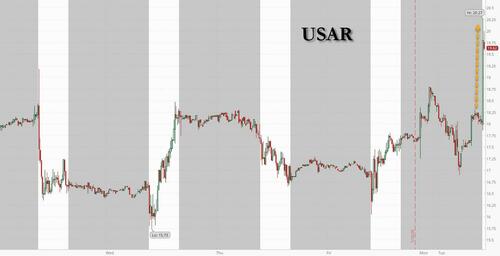

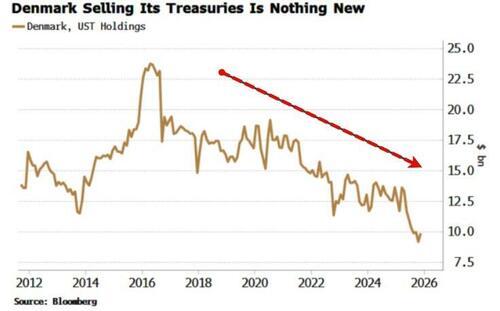

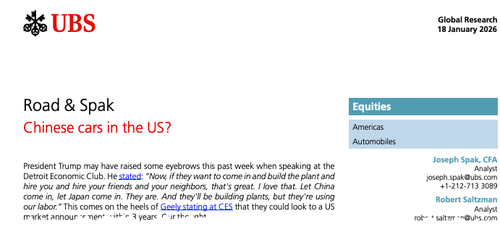

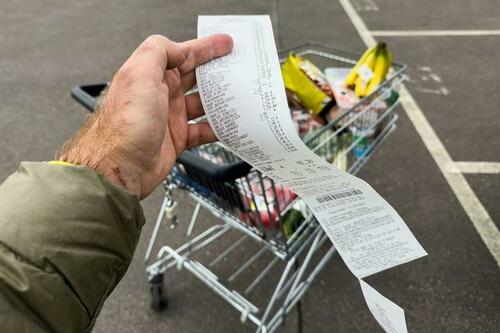

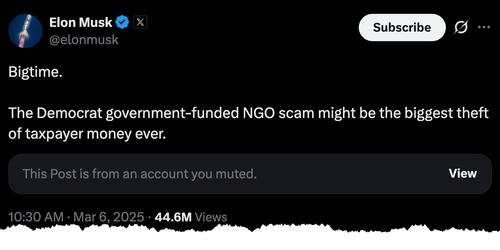


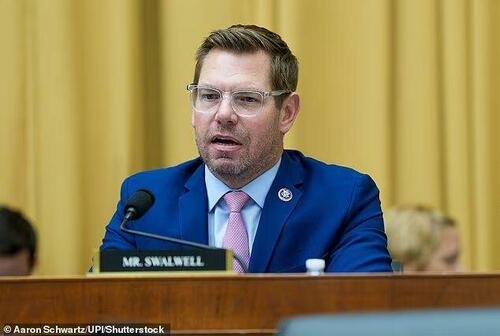
 According to Gilbert's complaint, Swalwell's property was listed as the couple's 'principal residence' when they took out a mortgage in April 2022
According to Gilbert's complaint, Swalwell's property was listed as the couple's 'principal residence' when they took out a mortgage in April 2022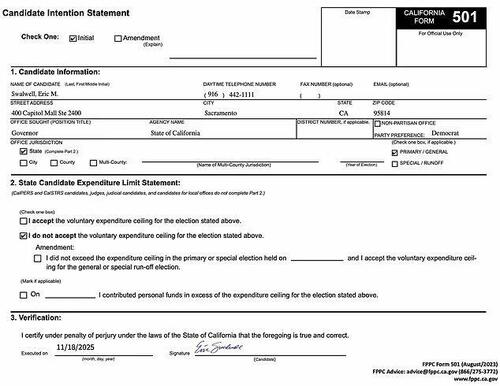 Swalwell's Candidate Intention Statement on December 4 lists his address as a business suite in a Sacramento high-rise
Swalwell's Candidate Intention Statement on December 4 lists his address as a business suite in a Sacramento high-rise Swalwell and Fang
Swalwell and Fang The Boring Company's Prufrock 5 tunneler (via X)
The Boring Company's Prufrock 5 tunneler (via X)
 Canada's armed forces file image
Canada's armed forces file image

Recent comments